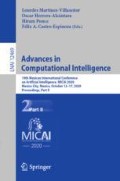Abstract
In this work multi-document, extractive summaries have been obtained using supervised learning algorithms in a well-known dataset (DUC 2002); the methodology has three steps: the pre-processing step, which filters irrelevant words and reduces vocabulary using stemming; the representation step, which transforms sentences into vectors; and the classification step which selects sentences for the summary. Noting that the last step is crucial because it determines the relevance of each sentence according to the information included in the embeddings. We found that the classifiers performance is not related to the summary quality mainly classifier’s goal is not aligned to summarizer’s goal, as classifier is based on selecting whole sentences, while summarization is evaluated by n-grams, for example ROUGE-n, and therefore it is relevant while comparing performances between different works in the state of the art.
This work has been possible thanks to the support of the Mexican government through the FOINS program of Consejo Nacional de Ciencia y Tecnología (CONACYT) under grants Problemas Nacionales, 5241, Cátedras CONACYT 556; the SIP-IPN research grants SIP 2083, SIP 20200640, and SIP 20200811; IPN-COFAA and IPN-EDI.
Access this chapter
Tax calculation will be finalised at checkout
Purchases are for personal use only
References
Acevedo-Mosqueda, M.E., Yáñez-Márquez, C., López-Yáñez, I.: Alpha-beta bidirectional associative memories: theory and applications. Neural Process. Lett. 26(1), 1–40 (2007)
Azhari, M., Jaya Kumar, Y.: Improving text summarization using neuro-fuzzy approach. J. Inf. Telecommun. 1(4), 367–379 (2017)
Cao, Z., Li, W., Li, S., Wei, F.: Improving multi-document summarization via text classification. In: Thirty-First AAAI Conference on Artificial Intelligence (2017)
Cao, Z., Wei, F., Li, S., Li, W., Zhou, M., Houfeng, W.: Learning summary prior representation for extractive summarization. In: Proceedings of the 53rd Annual Meeting of the Association for Computational Linguistics and the 7th International Joint Conference on Natural Language Processing (Volume 2: Short Papers). pp. 829–833 (2015)
Gambhir, M., Gupta, V.: Recent automatic text summarization techniques: a survey. Artif. Intell. Rev. 47(1), 1–66 (2016). https://doi.org/10.1007/s10462-016-9475-9
Gupta, V., Lehal, G.S.: A survey of text summarization extractive techniques. J. Emerg. Technol. Web Intell. 2(3), 258–268 (2010)
Hardy, H., Shimizu, N., Strzalkowski, T., Ting, L., Zhang, X., Wise, G.B.: Cross-document summarization by concept classification. In: Proceedings of the 25th annual international ACM SIGIR conference on Research and development in information retrieval. pp. 121–128. ACM (2002)
Lau, J.H., Baldwin, T.: An empirical evaluation of doc2vec with practical insights into document embedding generation. arXiv preprint arXiv:1607.05368 (2016)
López-Yáñez, I., Yáñez-Márquez, C., Camacho-Nieto, O., Aldape-Pérez, M., Argüelles-Cruz, A.J.: Collaborative learning in postgraduate level courses. Comput. Human Behav. 51, 938–944 (2015)
Mohri M., R.A., Talwalkar, A.: Foundations of machine learning. MIT Press (2018)
Moreno-Moreno, P., Yanez-Marquez, C., Moreno-Franco, O.A.: The new informatics technologies in education debate. Int. J. Technol. Enhanc. Learn. 1(4), 327–341 (2009)
Nallapati, R., Zhai, F., Zhou, B.: Summarunner: A recurrent neural network based sequence model for extractive summarization of documents. In: Thirty-First AAAI Conference on Artificial Intelligence (2017)
Tohalino, J.V., Amancio, D.R.: Extractive multi-document summarization using multilayer networks. Phys. A 503, 526–539 (2018)
Author information
Authors and Affiliations
Corresponding author
Editor information
Editors and Affiliations
Rights and permissions
Copyright information
© 2020 Springer Nature Switzerland AG
About this paper
Cite this paper
Gutiérrez Hinojosa, S.J., Calvo, H., Moreno-Armendáriz, M.A., Duchanoy, C. (2020). Does Supervised Learning of Sentence Candidates Produce the Best Extractive Summaries?. In: Martínez-Villaseñor, L., Herrera-Alcántara, O., Ponce, H., Castro-Espinoza, F.A. (eds) Advances in Computational Intelligence. MICAI 2020. Lecture Notes in Computer Science(), vol 12469. Springer, Cham. https://doi.org/10.1007/978-3-030-60887-3_26
Download citation
DOI: https://doi.org/10.1007/978-3-030-60887-3_26
Published:
Publisher Name: Springer, Cham
Print ISBN: 978-3-030-60886-6
Online ISBN: 978-3-030-60887-3
eBook Packages: Computer ScienceComputer Science (R0)

